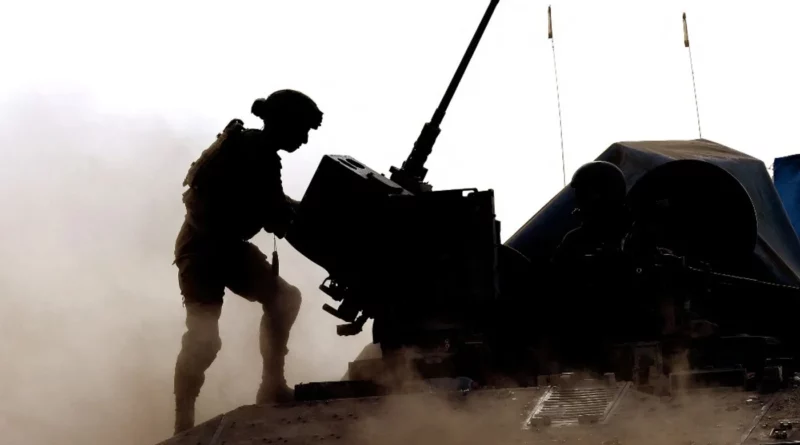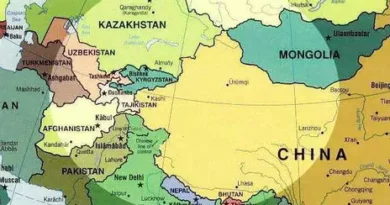How the Gaza war turned into Israel’s Vietnam
Source : middleeasteye.net – May 19, 2025 – Mehmet Rakipoglu
https://www.middleeasteye.net/opinion/gaza-war-turned-israel-vietnam-how
Abonnez-vous au canal Telegram Strategika pour ne rien rater de notre actualité
Pour nous soutenir commandez les livres Strategika : “Globalisme et dépopulation” , « La guerre des USA contre l’Europe » et « Société ouverte contre Eurasie »
Mehmet Rakipoglu is an assistant professor at Mardin Artuklu University, Department of Political Science and International Relations and Coordinator of Turkish Studies, Mokha Center for Strategic Studies. His work focuses on Turkish foreign policy, Gulf countries, and Islamic movements
The parallels grow stronger by the day: a technologically superior force mired in a prolonged, morally fraught, and politically costly conflict.
he genocidal war on Gaza has now surpassed 19 months, yet Israel’s military campaign has failed to achieve its strategic objective: the elimination of Palestinian resistance, particularly Hamas.
From the beginning, western powers have almost unconditionally backed Israel’s assault as a legitimate act of “self-defence”. This support has extended beyond military aid to diplomatic shielding, economic assistance and institutional cover on international platforms.
But even with this overwhelming backing and a total siege imposed on Gaza by land, sea and air, Israel has not managed to break the backbone of the Palestinian resistance.
Despite Gaza’s near-total devastation, Hamas and other Palestinian groups remain operational, continuing to launch rockets and conduct complex tactical operations, such as last month’s ambush near Beit Hanoun. After emerging from a tunnel to launch RPGs at Israeli military vehicles, injuring three soldiers, Hamas operatives detonated a bomb when rescue forces arrived, killing a warrant officer.
The operation by Hamas, which is proscribed as a terrorist group in the UK and other countries, exposed the vulnerabilities of Israel’s buffer-zone deployments and undermined the narrative of total control.
Israel has repeatedly asserted that areas like Beit Hanoun have been neutralised. The recent ambush sent a strategic message, showing that Hamas, even under relentless bombardment and occupation, remains capable of intelligence-gathering and precision targeting, thus outmaneuvering one of the most technologically advanced armies in the world.
This is where the Vietnam comparison becomes most striking. As the United States once learned, superior firepower and external backing do not guarantee victory over an entrenched and ideologically committed resistance force.
The Gaza war has increasingly become Israel’s Vietnam – an unwinnable campaign marked by military overreach, strategic misjudgment and growing political costs.
Deflecting criticism
Israel’s failure in Gaza is not limited to the battlefield. It extends deep into its political system and intelligence apparatus.
Prime Minister Benjamin Netanyahu’s government has faced growing internal turmoil, marked by resignations of top officials and internal blame-shifting. To deflect criticism over the Gaza debacle, Netanyahu has sought scapegoats, such as former Defence Minister Yoav Gallant. This erosion of political coherence has further inflamed Israel’s already fragile internal dynamics.
Follow Middle East Eye’s live coverage of the Israel-Palestine war
The most dramatic rupture, however, lies within the intelligence domain. The events of 7 October 2023 – when Hamas launched an unprecedented cross-border attack – exposed a total breakdown of Israel’s security architecture.
The failure of both the Shin Bet and the Mossad to anticipate and thwart this attack, despite surveillance operations that penetrate deep into Gaza, has sparked a broader debate about the viability of Israel’s security doctrine.
As former Prime Minister Ehud Olmert warned in Haaretz, Israel is now “closer to a civil war than ever before”. From this perspective, the Hamas attack did more than inflict military casualties – it fractured Israel from within.
The internal breakdown has extended to the military’s ranks. As reported by the New Arab, Israel is facing a wave of dissent within its army, with growing numbers of reservists refusing to serve, and military veterans expressing disillusionment over the war’s objectives and moral implications.
Another pillar of Israel’s vulnerability lies in the economic toll of its prolonged war on Gaza. The financial costs of sustaining military operations, maintaining the siege, and responding to regional threats has pushed the Israeli economy to a breaking point, with the government reportedly spending at least $260m a day on the war effort.
Domestically, the economic impacts are being felt across key sectors. Foreign investment has declined sharply. Tourism – once a crucial source of revenue – has plummeted amid security concerns stemming from cross-border missile attacks. Israel is no longer viewed as a stable destination for business or leisure.
While much of this burden has been temporarily offset by US and UK support, this aid is increasingly coming under scrutiny, as governments face mounting public pressure to end their complicity in the war.
Growing divisions
Indeed, growing divisions are emerging between Israel and its key backers. US President Donald Trump has pushed back against calls to cut tariffs on Israeli imports, noting that the US already provides Israel with $4bn in annual aid. Trump has also expressed frustration with Israel’s handling of the war, calling for an end to the conflict.
For decades, Israel enjoyed a kind of international exceptionalism that shielded it from accountability, allowing it to act with near-total impunity, even in the face of mounting war-crimes allegations. But the genocidal campaign in Gaza has begun to fracture this long-standing shield.
Since 7 October, global public opinion – particularly in the West – has shifted dramatically. Millions of people have mobilised to demand a ceasefire. This growing pressure from civil society has made it increasingly difficult for western governments to maintain unconditional support. Israel’s alignment with US policy has become a liability rather than an asset.
In the legal realm, Israel is facing unprecedented scrutiny. The International Court of Justice is examining whether its actions in Gaza amount to genocide. While the process will be lengthy, and some nations do not recognise the court’s rulings, the case is symbolic and its political weight is significant. A guilty verdict would not only damage Israel’s international standing, but could also implicate key leaders, including Netanyahu.
Dissent is also surging within Israel itself. Nearly 1,000 Israeli Air Force personnel signed a protest letter against the war, and could now face expulsion. This level of dissent within elite military circles signals profound unease with the direction of the war.
Beyond Israel, protests across western universities have been met with institutional backlash, exposing how deeply the suppression of pro-Palestinian advocacy has penetrated academic and civic life.
All of this shows how Israel’s war on Gaza has become increasingly unsustainable. The parallels with Vietnam grow stronger by the day: a technologically superior force mired in a prolonged, morally fraught, and politically costly conflict. Israel is trapped in a campaign it cannot decisively win, facing a resilient opponent, internal dissent and mounting international isolation.
Whether the world chooses to see it or not, Gaza has become Israel’s Vietnam.





L’enseignement concernant Gaza , n’est-il pas plutôt que la haine suprémaciste et guerrière, destructrice et génocidaire, de l’islam djihadiste à l’égard des non-musulmans et tout particulièrement des juifs et de l’Etat d’Israel le conduit à sa propre destruction………….alors que la paix et la prospérité pour Tous était possible.